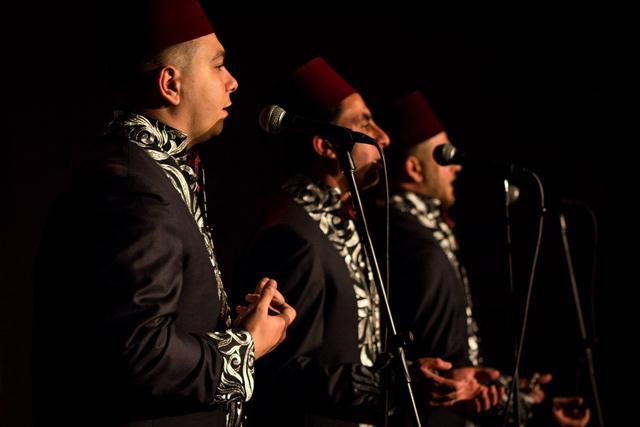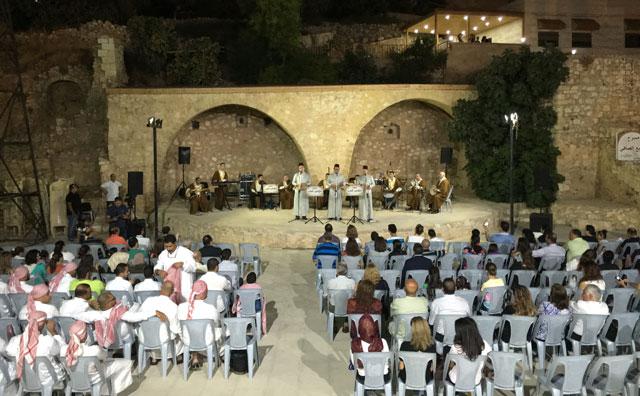You are here
Separated by the war, reunited by music: Syrian troupe keeps heritage alive
By Camille Dupire - Apr 02,2018 - Last updated at Apr 02,2018

Members of Salateen Al Tarab perform in their traditional dress in Jordan recently (Photo courtesy of Salateen Al Tarab Facebook page)
AMMAN — A troupe of musicians separated by the Syrian civil war is carrying on the Arab musical heritage through concerts performed in their new Jordanian home.
First formed in Syria in 1992, Salateen Al Tarab was disunited when the civil war broke out, forcing each of its members to flee to neighbouring countries.
“Some of us entered through the airport and some through the refugee camps to then end up in Amman,” Mostafa Abdel Razzaq Al Saghir, founder and manager of the group recalled, adding “we were able to meet up again in Jordan and, once we reached an adequate number to perform, we began working on putting the troupe back together.”
The Syrian Qanun player said they chose to start playing again because of their love of music and history. “It is a message in which we prove to the world that even from the womb of suffering, we can make happiness,” he told The Jordan Times.
“I came up with the idea after I saw how the Jordanian audience was an absolute fan of this type of singing,” Al Saghir continued, noting that “music can give the feeling of joy or the feeling of sadness; we notice when we perform that the audience sometimes laughs and sometimes cries”.
Stressing the importance of music in the Arab society, he said the band tries to preserve a heritage that has become “too rare nowadays”.
The band performs the Tarab of Aleppo and Almowashahat while also offering Egyptian, Iraqi, Jordanian and Lebanese Tarab. “We play in the authentic Shami dress composed of kanzab, shawl and turboch. This way, we give the spectators a sense of the old, authentic Arabic character,” Syrian rhythm player Mohammad Omar Nasr said.
“We did not want to indulge in the commercial songs. We try to offer a true sense of taste,” Nasr commented, highlighting “the Arab world is hungry for this kind of art. These are the reasons that gave the Arab music such an influence in the world.”
Although the troupe members did not know each other before they started, they said they progressively got to befriend one another through artistic gathering and concerts.
“After the shock of the war, we all suffered from its impact on our spirits and souls, especially as a result from the pressure felt by our people and families back in Syria,” vocalists Fadi Abdel Majeed Badli and Muhannad Khalid Qassem remembered.
“However, our music was not affected and we still play it in its initial form,” they continued.
Since it was created 26 years ago, Salateen Al Tarab has seen generations of performers follow in the footsteps of the founding members, continuing to perform shows under the name and artistic identity of the initial group.
“Salateen Al Tarab has a history full of wonderful works of art. As time passes by, the bigger our audience and our fan base get,” said drum rhythm player Hamam Adnan Abu Hammam, the only Jordanian of the band, noting that the demand has increased through frequent and high-level concerts.
“We get many requests from Arab and European festivals and concerts, but we cannot travel from Jordan and get back due to some visa issues,” Al Saghir explained, noting however that the troupe is currently trying to obtain facilities to perform in several festivals in Algeria, Tunisia, Morocco, Qatar, Egypt, Germany, France and Belgium.
“Before the war in Syria, we had performed in most of the Arab world and in many countries in Europe, America and Canada. Despite the difficulties we are facing because of the situation in the region, we will keep trying to spread this love for our country by sharing its beautiful heritage through our music,” he concluded.
The band is expected to perform at the Haya Cultural Centre on April 16, as part of “EUD Syria Concert”, a unique musical event held within the framework of the second Brussels conference on Syria.
“This event, organised by the EU and European Union National Institutes for Culture (EUNIC) seeks to highlight the cooperation between the EU and the Hashemite Kingdom of Jordan in providing support to Syrian refugees in the country,” said Gaelle Sundelin, EUNIC project manager, voicing her admiration for the reformed band.
Related Articles
AMMAN — Foreign officials and music fans on Monday enjoyed a night of music held to celebrate the power of culture in building communities’
FUHEIS — Sitting in an outdoor theatre in Fuheis city on Thursday night, Basil Elias could not hide his excitement over attending a concert
BERLIN — Instead of bombs there were beats. Guitars took over for guns. And there were cheers, not screams.



















